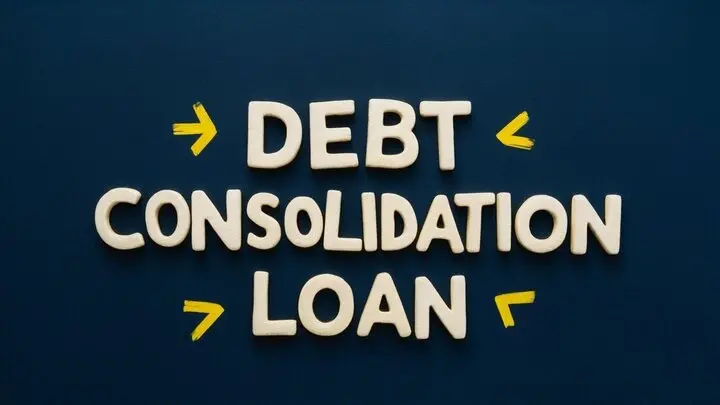-
Posted on: 29 Jun 2024

-
Overwhelming several debts and exorbitant interest rates? Possibly the solution is a debt consolidation loan! Combining your current loans into one loan with a (probably) reduced interest rate helps you simplify your budget. This implies one monthly payment to control and maybe more budget breathing room. Wait, though, is eliminating another loan harmful to your credit score? Not to panic; if done carefully, we will discuss the benefits and drawbacks of debt consolidation as well as how it might eventually assist in raising your credit score. Let's start to see if debt consolidation is the appropriate action for you!
What is debt consolidation?
If you have several high-interest debts on several credit cards or loans, debt consolidation benefits you since it aggregates all the debt into one single loan. There is just one monthly payment to make, hence occasionally the interest rate charged may be less than the several installments to be made. Nonetheless, debt consolidation does have certain advantages for credit, hence its demerits are clearly and rather obvious, particularly in terms of credit.
One uses a debt consolidation loan as follows:
One type of debt relief debt consolidation loan is one in which you obtain one large loan to pay off your other obligations and then utilize the money from this one loan to pay the rest. This essentially implies that you now have one new debt consolidation loan and one payment to make instead of the several loans and their matching installments you had earlier. Usually just unsecured personal loans, secured variants of this type of borrowing are rare yet feasible.
Naturally, the primary goal is to spend less on monthly installments reducing your interest rate. For instance, supposing you find it difficult to pay off ten thousand dollars of credit card debt with an average interest rate of nineteen percent; consolidation can reduce the rate to nine percent and cut your monthly interest payments. Consolidating the debts into a new loan helps you to make one payment instead of having to pay many credit card balances or other loans routinely, so reducing the number of payments to be paid.
Getting a fixed period that will let you pay off all debt and at last be free of it is another benefit. Although CC offers can entice you into debt maintenance, an installment loan like debt consolidation has a termination date. Many of the loans then take 3-5 years to be paid off instead of being a lifetime process if payments are maintained under control.
Consolidation of Debt: Its Drawbacks and Risks
You should still take some serious thought, though, given: You should still take some serious thought, nevertheless, regarding:
Saying goodbye to credit cards is not a wise option if you intend to do it in a way that would damage your credit scores, such as shutting very old or extremely large limit accounts. This could more than balance the benefits of debt consolidation.
Again, caution should be exercised not to rely too much on accessible credit or utilize credit cards as this could merely lead to more debt than before.
Even if you spread out your bills for the duration of the loan—say, five years or more—you would wind up paying far more interest than if you paid off your debts much earlier.
The way debt consolidation loans affect credit scores and credit reports is another crucial topic that deserves attention. The result will rely on your attitude to the process.
Therefore, this part tries to show how credit is affected by debt consolidation.
In its exact sense, a debt consolidation loan by itself will not harm your credit scores. It is noteworthy that rather than on the method you choose to pay your debts, scores mostly rely on the time it takes for you to make little payments.
But during debt consolidation, you could unintentionally commit certain credit blunders that lower your scores:
Closing credit card accounts is therefore essential since it reduces the total credit amount and little purchases can drastically affect ratings.
Taking extra consolidation loans within a short period results in more hard inquiries on your credit records than lower scores.
Another element of raising the credit usage percentage is not paying off the debt with the new combined loan and returning to debt.
Therefore, debt consolidation by itself does not harm your credit score; rather, the way you handle other aspects of your credit profile while doing so is most definitely harmful.
As follows are some practical ideas to improve creditworthiness while working on debt consolidation:
Following these guidelines will help you either maintain or possibly raise your credit score by grouping your debts: Consolidating your debt will help you to either safeguard or perhaps raise your credit score:
Within two weeks, complete loan applications for several lenders; credit bureaus classify such type of rate searches as a single hard credit check instead of penalizing you with many hits every time you apply.
It's best to keep the credit card accounts open rather than closing them; save the credit cards for emergencies only by stashing them in a drawer or shoebox. This is crucial since open accounts guarantee the credit history is preserved and the remaining credit amount is known.
Make sure your recently combined loan is configured for automated payments so you never miss any deadlines. The payment history is the most important among all the factors used to establish credit scores.
Reducing the credit used depending on credit card balances is another crucial element; if you still have credit card accounts, it is advisable to pay them off down to guarantee you keep your credit use ratio low. Additionally one should make sure that neither personal nor overall credit card balances should be more than thirty percent of the credit card limit.
Once your consolidation loan is paid off, channel those monthly payments into even faster payments for another obligation. One at a time pay off the remaining balances.
The Balance Point
Debt consolidation can help you pay off your debt, cut interest rates, and simplify frequently complex and multiple debts. Though indirectly, one should be cautious to avoid such activities as paying off credit accounts using the available credit limits or other actions that affect the credit rating while performing all the required adjustments. If done wisely, consolidating debt will help you avoid the debt trap without damaging your creditworthiness for the next loans.




